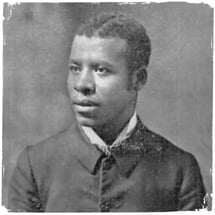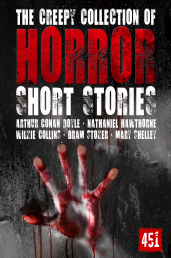For our next 'Founders of Black SF' Patty Nicole Johnson will be discussing social activist and author Sutton E. Griggs. Hear all about his iconic sci-fi novel and how it has influenced the Afrofuturism books of today.
Founders of Black SF: Sutton E. Griggs & Imperium in Imperio
By Patty Nicole Johnson

When Watchmen landed on HBO in late 2019, many viewers were in awe. It wasn’t solely because of the masterful centring of Black people in a science-fiction narrative or the knockout performances from Regina King and Yahya Abdul-Makeen II. The show featured a scene that is very close to a history of which few U.S. citizens are aware – a depiction of the Tulsa Race Riot of 1921.
The predominantly Black Greenwood District of Tulsa, commonly referred to as Black Wall Street, was a place of prosperity. Black attorneys, bankers, real-estate brokers and more coalesced in this haven for upward mobility, in a time where many places wouldn’t accept the patronage of Black consumers. Yet it wasn’t long before white extremists laid siege to the area, ultimately burning over a thousand homes and claiming 36 lives.
This moment in history has parallels with the works of Social Activist and Baptist Minister Sutton E. Griggs. The theologian was a prolific writer throughout his career, publishing more than 33 books. His 1899 debut novel, Imperium in Imperio, depicts a secret society that advocated for the formation of Texas as a Black republic.
‘Imperium in imperio’ loosely translates to ‘an empire within an empire’, setting the tone for what’s to come later in the story. The novel opens with two mothers who send their son to a ‘colored’ school taught by a white man who immediately makes disparaging remarks about his duty. The man receives young Belton rudely, yet welcomes another child Bernard more pleasantly because he finds his mulatto mother attractive. The teachers continue to give Belton a hard time while treating Bernard with kindness. Both boys prove to be exemplary students. Yet the instructor fans the flames of a rivalry between them by helping Bernard surpass Belton. This foreshadows later events in the story yet also mimics reality:
Even in modern times, Black people are forced to compete for that ‘one spot’ at the top. This is especially the case in creative industries, such as fiction. A story detailing a Black experience or narrative may become very successful. Yet literary gatekeepers will then claim there is only room for one Black person writing on the topic. Others have rightly argued that the Black experience is not a monolith and readers would be interested in many stories from Black authors, if presented with the opportunity to read them.
The two males graduate and Bernard, who is of means, attends Harvard University. Belton can not afford to pursue higher learning on his own, yet his riveting graduation speech had caught the attention of a local paper, The Temps, which printed it in its entirety. The text is syndicated across the country until the U.S. president comes across the oration and writes Belton a letter of congratulation. The speech also makes an impression on V.M. King, the editor of The Temps, who worries about Belton because of the issues ‘negroes’ face. Not a true egalitarian, King takes what he sees as a logical approach: that it is the fault of white people that ‘negroes’ see themselves as equal because they introduced them to the idea.
Later, King calls on Belton to offer him support during this time of notoriety. Belton expresses his dismay over not being able to attend college and King offers to pay. At his home when King is presenting the cheque to Belton and his children look on in wonder, King asks Belton to keep in mind the differences in white people of the time:
“...there is a good side to the character of the worst class. Always seek for and appeal to that side of the nature.”
Throughout the story, Belton’s good nature is apparent throughout and he treasures the words in each future interaction with white men and women.
Belton attends college in Nashville and takes joy at witnessing what looks like a Black man being treated equally amongst his peers. Wishing to see more of this Black man, who Belton discovers to be the vice president of faculty, he leaves his room early one morning to sit in on a faculty meeting. Yet all goes wrong as he is seen spying and, in his rush to escape, he finds himself in a chicken coop and so dismissed as a chicken thief. Belton doesn’t find out what happened at that meeting, but, on an errand to a sister university, he observes the unfair treatment he had feared. He along with other students pen a letter requesting that the faculty enact fair treatment guidelines for their teachers. This act of civil disobedience was but the first by this student who was proving himself a powerful orator and scholar at the institution.
We shift back to Bernard, who graduates college and opens a law office in a seedy part of town, even though he is very accomplished. He navigates both worlds as she traverses the elite crowds, while helping his kinfolk in need.
After Belton graduates, he continues being outspoken. After encouraging Black men to vote, he’s harassed by a mob that seeks to lynch him. They get very close, in fact, shooting him in the head with plans to dissect his body. He escapes, yet not before killing the doctor. Eventually he’s arrested for murder, yet Bernard intervenes and appeals the conviction.
Some time later, Belton calls on Bernard to join him in Waco, Texas to join Imperium in Imperio in their effort to dismantle the system of segregation and free Black people from violence and segregation. Bernard is elected president of their organization and he along with its members make lofty plans for infiltrating the U.S. Navy to assist in the establishment of the new nation-state of Texas. Belton opposes this, holding on to the words King gave him in choosing to see the good side of white men and women, ultimately believing he could work with them, without succession, to bring equality to the Black population. Belton quits the group, knowing the penalty is death. Even though he receives a way out from his comrades, he chooses what he feels is his obligation and is executed for treason.
After reading this novel, you may wonder who was right. Belton or Bernard? Unfortunately, there’s no right answer. Belton believed his vision was possible and it led to his demise. While his life was taken by his own people, he was a casualty of white influence. He knew that and couldn’t break his shackles, which is why he allowed his death. If he wasn’t killed and he had got to witness the future of his people would he have been proved right, eventually? Belton would have had to become a time traveller, because in the 21st century, Black people are still fighting for their humanity.
In contrast, it can’t be said that Bernard was correct either. A nation state in Texas would improve the lives of Black people there, but it wouldn't do much to assist those left behind. There are many borders throughout the world, and nationalism has historically widened divides, not closed them.
This novel is peppered with levity and moments of charm where Belton is using the facilities known to him in his quest to thrive while demanding equality. The story has paved the way for the Afrofuturism of today. Samuel R. Delany and Octavia Butler are two legends in this offshoot of speculative fiction that centres around the aspirational Black narrative. The evolution continues today with Nnedi Okorafor coining Africanfuturism to describe her work. She expertly weaves in myths and tradition from Africa in her visions of the future.
We’re over a century removed from Juneteenth 1865, the true emancipation of U.S. slaves, yet we’re still experiencing a range of repercussions from the nearly 250-year long system. There remains fertile ground for the growth of new themes and ideas as we envision true freedom long before it’s made a reality.
Patty Nicole Johnson is a Black and Puerto Rican science-fiction writer. In her Chicago bungalow, she weaponises time travel, holograms, multiverses and more to envision a more equitable society. Her work has been published or is forthcoming in New American Legends, On the Seawall, Midnight & Indigo, Constelación and
Black Sci-Fi Short Stories combines new stories with early speculative and proto-science fiction by Black writers of an older tradition. Alex Award-winning novelist Temi Oh provides the foreword, alongside an introduction by Sandra M. Grayson, author of Visions of the Third Millennium: Black Science Fiction Novelists Write the Future (2003). With invaluable promotion and editorial support from Tia Ross and the Black Writers Collective.
Dystopia, apocalypse, gene-splicing, cloning and colonization are explored within the collection by new authors and combined with proto-sci-fi and speculative writing of an older tradition (by W.E.B. Du Bois, Martin R. Delany, Sutton E. Griggs, Pauline Hopkins and Edward Johnson) whose first-hand experience of slavery and denial created their living dystopia. Many of the themes in Sci-fi reveal the world as it is to others, show us how to improve it, and give voice to the many different expressions of a future for humankind. You can find the full contents list here.
Don't forget to come back next week to hear all about our next quintessential black science fiction author on the list!





